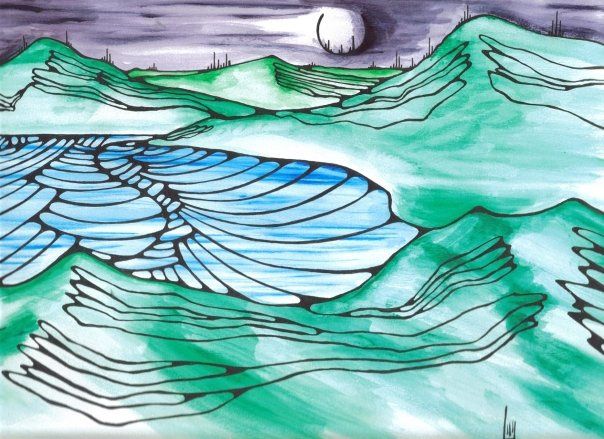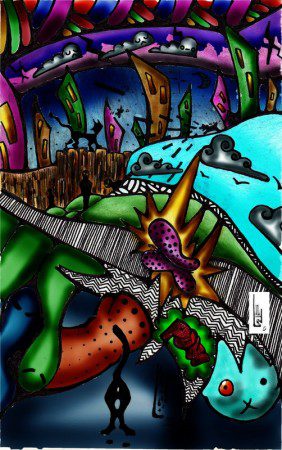Artist Tiffanee Griffiths talks to Disability Horizons about how her invisible disability has affected her work and how something like a small, socially accepted handshake can have such an impact.
My name is Tiffanee Griffiths and I am an artist from the Interior of British Columbia, Canada. I have not always been disabled but I have always been an artist. An attack in 2009 left both of my hands badly broken, changing my art forever.
Looking through my portfolio you can see my progression as I have learned to hold my paintbrush again.
I will never draw the same smooth lines that I prided myself on prior to my injuries, and that has been the most difficult thing to come to terms with. I am learning to accept what I am able to do with my hands and how there will be frustrating challenges with small everyday tasks; opening pickle jars, turning round door knobs, the list goes on. But life is all about accepting, adapting and carrying on.
My disability can be categorised as an ‘invisible disability’; if you were to meet me, you would never know that I am ‘disabled’ unless I told you, and I never feel comfortable explaining how I’m ‘broken’ on an initial introduction. This brings me to my topic; shaking hands.
Why is shaking hands such an accepted social obligation? And how do I respectfully decline shaking someone’s hand without offending them?
My issue with shaking hands stems not from the fear of germ spreading or clammy hands, but rather the pain when a firm handshaker grips and squeezes, right where I have four pins holding a steel plate. OUCH!
Usually I try not to flinch and yank my hand away for fear that questions would follow, and then the apologies for not knowing. Honestly, it’s just easier when I can get through an important meeting without having to tell my story and getting that look of pity. Oh how I despise that look of P.I.T.Y.
This is the very embarrassing issue that I am faced with on a regular basis; to shake, or not to shake. How can I leave a positive lasting impression without coming off… weird?
I was always a firm hand shaker; I was brought up believing that a good handshake is the sign of good character. Now I extend my hand shyly, wincing every time.
In 2010 I visited Vancouver for a second opinion on my injured hand. I was referred to a hand specialist who is highly recommended throughout the medical world. While waiting to be called I was oddly both anxious and excited to see just how this ‘hand doctor’ would extend his hand to me.
When my name was called niceties were exchanged and he offered his hand, but not in the traditional right-hand-out-vertical-with-thumb-up way. He instead held his hand out like a C, still sideways but cupped, and he gently lifted my hand up while covering it with his other. It was wonderful! So gentle, so majestic; I almost blushed.
I went away from the appointment with an understanding of what ‘honoured to meet your acquaintance’ must have been like back when ladies were ladies and gentlemen were easier to find.
Now, two years later, I still smirk when I think of how that old Dr. had made me almost blush. It’s funny how such a soft handshake, a small gesture, can make such a big impression. It just goes to show that it pays not to assume, to instead be thoughtful in the way we approach such accepted ‘norms’.
Now, if I can just figure a way to put my hand out without looking like I’m expecting it to be kissed! Another awkward observation I’m sure to have an opinion on in the future ![]()
By Tiffanee Griffiths
Take a look at more of Tiffanee Griffiths‘ work by visiting her website.

